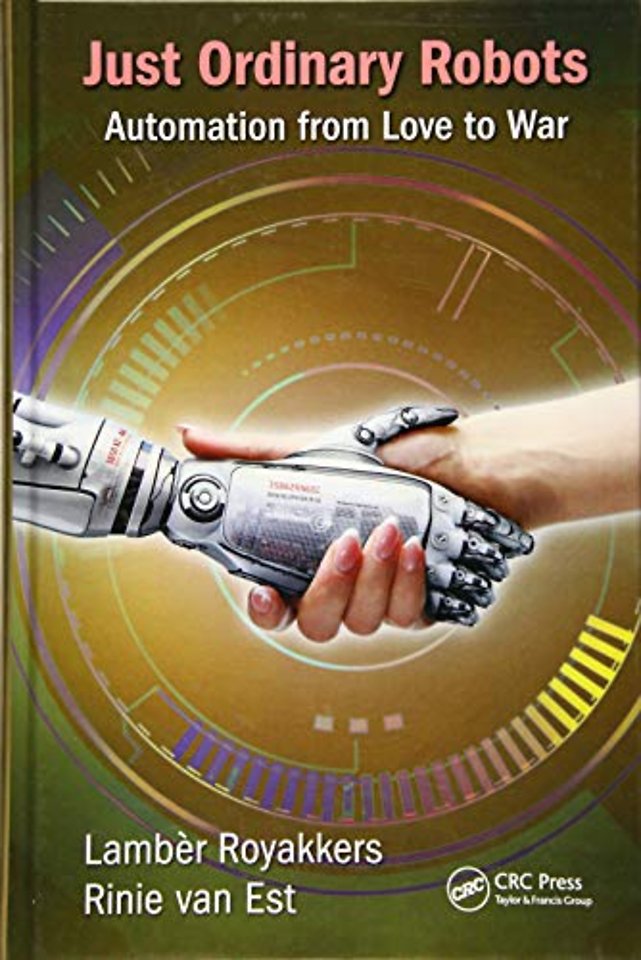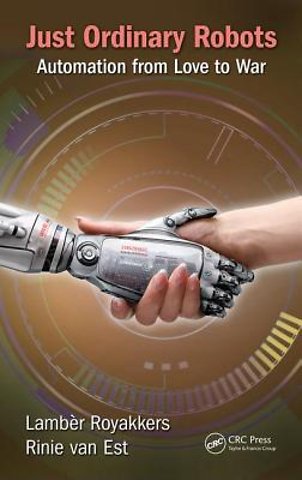



Lambèr Royakkers is an associate professor in ethics and technology at the Department School of Innovation Sciences of the Eindhoven University of Technology, The Netherlands.
Meer over de auteursJust Ordinary Robots
Automation from Love to War
Samenvatting
A social robot is a robot that interacts and communicates with humans or other autonomous physical agents by following social behaviors and rules attached to its role. We seem to accept the use of robots that perform dull, dirty, and dangerous jobs. But how far do we want to go with the automation of care for children and the elderly, or the killing of terrorists? Would we be setting humanity aside if we accepted such automation?
Just Ordinary Robots: Automation from Love to War provides a socially involved, yet sober, view into the new age of robots. It supplies a cutting-edge look at robot technologies, including what these technologies are capable of and the ethical and regulatory questions they raise.
The book surveys the various types of social robots and examines their social significance in homes, health care, traffic, the police, and the military. Considering the technical characteristics and societal expectations of robots in these areas, it explores what is possible right now in terms of robot technologies. It also looks into the social, ethical, and regulatory issues future robot technologies will create.
The text provides authoritative insights into the social significance of robots for the medium and long term. Illustrating the political, administrative, and regulatory consequences related to each area, it highlights key points that need to be publicly discussed or put on the agenda by today’s politicians and policy makers.
Features
- Surveys recent robotics developments across five areas: home, health care, traffic, the police, and the military
- Explains the technical promises and societal expectations of robotics
- Details what is possible right now in terms of new robotic technologies
- Identifies the social and normative questions that loom over the short and long term
- Highlights key points that need to be discussed publicly or put on the agenda by politicians and policy makers
- Considers the issues surrounding emerging robot technologies, including their capabilities and the ethical and regulatory questions they will raise
Specificaties
Over Rinie van Est
Inhoudsopgave
-With Vision
-Technically Speaking
-From Automata to Robots
-Robot-Friendly Environments
-Robot Body
-Robot Brain
-Networked Robots and Human-Based Computing
-Seen Socially
-Information Technology
-Lifelike Appearance
-Level of Autonomy
-Robotization as Rationalization
-More Explorations
-Interview with Luciano Floridi (Philosopher and Ethicist of Information at -Oxford University)
-References
Home Is Where the Robot Is: Mechanoids, Humanoids, and Androids
-Introduction
-Mechanoid Robots: The Vacuum Cleaner
-Experiences of Early Adaptors: Roombarization
-Reducing Complexity of Household Tasks
-Liability of Home Robots
-Humanoid Robots: The Companion
-Robot Body
-Human–Robot Interaction
-Social De-Skilling
-Android Robots: The Sex Robot
-Roxxxy
-Benefits of Sex Robots
-Social and Ethical Issues
-Observational Conclusions
-Household Robots
-Companion and Sex Robots
-Interview with Kerstin Dautenhahn (Professor of Artificial Intelligence, University of Hertfordshire, United Kingdom)
-References
Taking Care of Our Parents: The Role of Domotics and Robots
-Introduction
-Domotics for Care for the Elderly
-Paradigmatic Shift in Care
-Ethical Issues
-From Home Robotics to Robots in the Home
-Increasing the Pace of the Paradigmatic Shift in Care
-General Ethical Issues Relating to Care Robots
-Specific Ethical Issues with Regard to the Role of Care Robots
-Robot as Companion
-Robot as Cognitive Assistant of the Care Recipient
-Robot as (Supporter of the) Caregiver
-Observational Conclusions: The Long Term
-Interview with Hans Rietman (Professor of Physical
-Medicine and Rehabilitation, University of Twente)
-References
Drones in the City: Toward a Floating Robotic Panopticon?
-Introduction: Amazon PrimeAir
-Civil Applications of Drones
-Recreational Use
-Drone Journalism
-Precision Farming
-Drones for Law Enforcement
-Robocop
-Tasks of Police Drones
-Examples of Police Drones
-Legal and Ethical Issues
-Safety
-Aerial Safety
-Improper Operations
-Hacking of Drones
-Drone Hunting
-Privacy
-Reasonable Expectation of Privacy
-Voyeurism
-Big Brother Drone Is Watching You
-Chilling Effect
-Regulations of Drones
-Regulations in the United States Governments
-Regulations in the European Union
-Proliferation of Drone Regulations
-Concluding Observations: Drones Create a Floating Robotic Panopticon
-Interview with Mark Wiebes (Innovation Manager with the Dutch National Police)
-References
Who Drives the Car?
-Introduction
-Problems for Modern Road Traffic and Their Costs
-Traffic Victims
-Traffic Congestion
-Pollution
-Driver Assistance Systems (Levels 1 and 2)
-ABS and ESC
-Adaptive Cruise Control System and Stop-and-Go Systems
-Pedestrians’ and Cyclists’ Airbag
-Pre crash System
-Limited Self-Driving Automation (Level 3)
-Traffic Management
-Cooperative Systems
-Cooperative Driving
-Autonomous Car (Level 4)
-AutoNOMOS and the Remotely Controlled Community Taxi
-Social and Ethical Issues Surrounding Car Robotization
-Acceptance
-Privacy
-Security and Safety
-Better Driver
-Liability
-Legislation for Limited and Full Self-Driving
-Concluding Observations
-Short Term: Driver Assistance Systems (Levels 1 and 2)
-Medium Term: Cooperative Systems (Level 3)
-Long Term: Autonomous Car (Level 4)
-Interview with Bryant Walker Smith (Assistant Professor of
-Law, University of South Carolina)
-References
Armed Military Drones: The Ethics behind Various Degrees of Autonomy
-Focus on Teleoperated and Autonomous Armed
-Military Robots
-Unarmed Military Robots
-Armed Military Robots
-Autonomy of Military Robots Is High on the Agenda
-Military Robots and International Humanitarian Law
-Tele-Led Drones
-Autonomous Drones
-Question of Responsibility
-Responsibility of Manufacturers
-Responsibility of Human Operators
-Responsibility of the Commanding Officer
-Proliferation and Security
-Concluding Remarks
-Social and Ethical Issues
-Regulation
-Interview with Jürgen Altmann (Physicist and Peace Researcher at TU Dortmund University)
-References
Automation from Love to War
-Future Expectations and Technical Possibilities
-Influential Strong AI Pipe Dream
-Successful and Pragmatic Weak AI Approach
-Exploring Artificial Social Intelligence
-Exploring Artificial Moral Intelligence
-Expected Social Gains
-Robots as Information Technology
-Monitoring and Privacy
-Safety, Cyber Security, and Misuse
-Lifelike Appearance of Social Robots
-Degree of Autonomy of Robots
-Systems View on Responsibility and Liability
-Man in the Loop
-Man on the Loop
-Man Out of the Loop
-Robot Systems as Dehumanizing Systems
-Undermining Human Dignity
-Undermining Human Sustainability
-Current Relevance
-Governance of Robotics in Society
-Putting Users at the Center
-Political and Regulatory Issues
-Balancing Precaution and Proaction
-Epilogue
-References
Index
Anderen die dit boek kochten, kochten ook
Rubrieken
- cadeauboeken
- computer en informatica
- economie
- filosofie
- flora en fauna
- geneeskunde
- geschiedenis
- gezondheid
- jeugd
- juridisch
- koken en eten
- kunst en cultuur
- literatuur en romans
- mens en maatschappij
- naslagwerken
- non-fictie informatief/professioneel
- paramedisch
- psychologie
- reizen
- religie
- schoolboeken
- spiritualiteit
- sport, hobby, lifestyle
- thrillers en spanning
- wetenschap en techniek
- woordenboeken en taal





